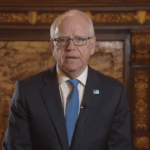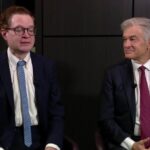
Debate moderators play an essential role in shaping the conversation between political candidates, and when they do their job well, they usually fade into the background. The debate itself should take center stage, not the moderators.
Unfortunately, that standard wasn’t met during the latest presidential debate between Donald Trump and Kamala Harris, moderated by ABC News anchors David Muir and Linsey Davis.
From the outset, few expected impartiality from Muir and Davis, given their track record on how they’ve covered the candidates in the past. But what unfolded went beyond partisanship, setting a new low for debate moderation. The pair repeatedly interrupted Trump, fact-checked him in real-time—often with questionable accuracy—while offering Harris a lifeline whenever she struggled.
And then we had this disgusting post from the left:
FACT CHECK
TRUMP: “People don’t leave my rallies.”
TRUE: They’re carried out in body bags.— The Onion (@TheOnion) September 11, 2024
And just in case they take it down, here is a picture of the post.

Instead of keeping the debate balanced, they shifted topics when Harris seemed cornered and allowed her to get away with a string of falsehoods, remaining completely silent as she made bold, inaccurate statements.
Take, for example, when Trump brought up the issue of unchecked illegal immigration. He cited instances from Springfield, Ohio, where residents had reported seeing Haitian immigrants taking local pets, a serious claim that had been discussed in public hearings. Muir was quick to jump in, claiming that the city manager of Springfield had denied any credible reports of such events. However, this so-called “fact-check” fell apart when a police recording surfaced, proving that residents had indeed made such complaints. This kind of selective fact-checking didn’t go unnoticed and only served to bolster criticism of Muir’s approach to moderation.
SCOOP: A recording of a police phone call obtained by The Federalist reveals a local resident reporting a group of Haitian migrants carrying four geese in Springfield, Ohio two weeks ago.
Latest in @FDRLST: https://t.co/9TolXHTfRf
— Tristan Justice (@JusticeTristan) September 11, 2024
On the other side, Harris made multiple misstatements that Muir and Davis didn’t address. Her claims about a “Trump Abortion Ban” denying IVF treatment and the assertion that Trump would sign a national abortion ban were both easily debunked but were left unchallenged. She also repeated several debunked talking points, such as Trump’s alleged “fine people on both sides” comment and misinformation about the Supreme Court’s ruling on presidential immunity. Yet, Muir and Davis didn’t push back or offer clarifications, allowing her statements to go unchecked.
At one point, when Trump responded forcefully to Harris’ claim that he would weaponize the government against political opponents, Muir cut him off, stating that there were “a lot of things to get to.” This move was emblematic of the entire evening, where Trump’s responses were truncated while Harris was allowed more leeway.
Critics of Muir and Davis’ performance would argue that they fell into the very traps warned about by communications expert Jeffrey McCall in an op-ed published before the debate. McCall urged the moderators to avoid becoming “pseudo-debaters” and to resist correcting the candidates themselves, leaving that task to the candidates on stage. By interjecting with their own views and poorly executed fact-checks, Muir and Davis blurred the lines between moderator and participant, diminishing their credibility and sparking an online firestorm of accusations of bias.
WATCH: @TulsiGabbard fact checks Kamala Harris’ pathetic lies.
She tried to say he supports a federal abortion ban — he does not.
She tried to tell the American people that he wants to ban IVF — he does not.
She tried to say he wants to ban birth control — he does not. pic.twitter.com/D9ozAfqXMW
— Trump War Room (@TrumpWarRoom) September 11, 2024
The result was a debate that left many Americans disillusioned. Instead of hearing a robust discussion between Trump and Harris, viewers were treated to a lopsided event where one candidate was scrutinized relentlessly while the other was given a free pass. In the process, Muir and Davis not only damaged their own reputations but further eroded the public’s trust in fair and balanced debates.
At a time when Americans are craving honest discussions and clear contrasts between candidates, the role of the moderator should be simple: ask fair, balanced questions and let the candidates make their case. Sadly, this debate failed to meet that standard, leaving viewers with little hope that future debates will be any better.








